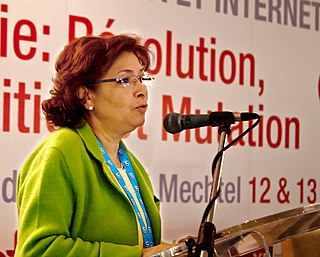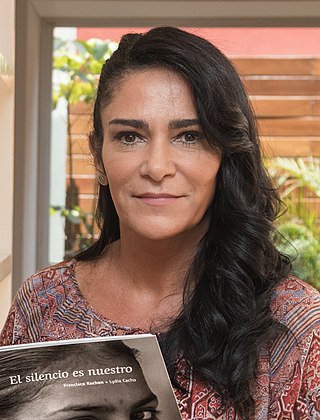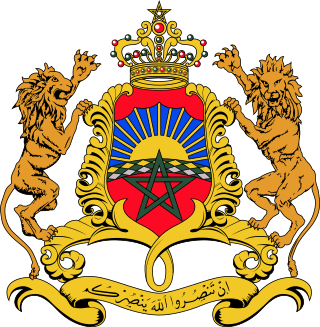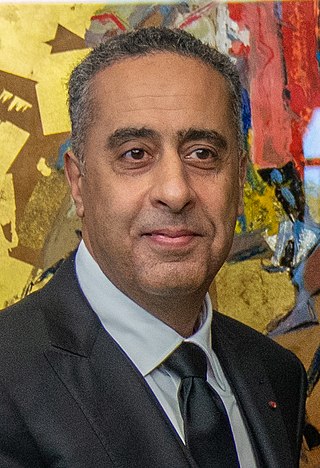Related Research Articles

Sihem Bensedrine is a Tunisian journalist and human rights activist. In 2005, she was honored with the Oxfam Novib/PEN Award.

Lydia María Cacho Ribeiro is a Mexican journalist, feminist, and human rights activist. Described by Amnesty International as "perhaps Mexico's most famous investigative journalist and women's rights advocate", Cacho's reporting focuses on violence against and sexual abuse of women and children.
Roya Toloui is a prominent Kurdish-Iranian journalist, human rights activist and feminist, currently residing in the US. She was born in Baneh in western Iran. She received her high school diploma at Baneh and her PhD in Medical laboratory from University of Mashad.

Andrei Lvovich Nekrasov is a Russian film and TV director from Saint Petersburg.

Morocco became a highly repressive country under the absolute monarchy of King Hassan II, and continues to be considered repressive under the reign of King Mohammed VI, though the latter has instituted some reforms. Dozens of journalists, artists, and ordinary citizens are regularly sentenced to lengthy prison sentences for exercising basic rights enjoyed elsewhere in the world, such as freedom of the press, protesting the government, or criticizing government officials. Morocco heavily restricts basic human rights, such as freedom of speech, the right to assembly, and the right to criticize officials. Moroccans also feel the pressures of inflation within the country, such as the lack of basic services like healthcare, clean water, and the difficulty of parents to access quality education for their children. While there have been a handful of reforms that have been generally welcomed internationally, most Moroccans feel this is insufficient, and continue to be unhappy with the trajectory of the country under the policies of King Mohammed VI, despite his transition of the government to an ostensible constitutional monarchy. Under his father, King Hassan II, Morocco had one of the worst human rights records in Africa and the world, especially during the time period known as the "Years Of Lead", which lasted from the early 1960s until the late 1980s; it was a period in the country's history that was known for the brutal repression of political dissent and opposition, that involved wide-scale arrests, arbitrary detention, lengthy imprisonment, and even killings of political opponents. Currently, Morocco continues to face some of these issues, as well as other human rights problems, such as poor prison conditions, the mistreatment of women and the LGBT community, and the widespread use of torture by police. Despite the considerable improvements made in the last several years under the leadership of King Mohammed VI, who has rolled back some of his father's harshest decrees, repression of political dissidence, and torture of citizens by officials, is still commonplace in Morocco today.

Democratic Way is a legal Hoxhaist Marxist-Leninist political party in Morocco led by Mustapha Brahma and includes former members of the heavily repressed Moroccan Communist Party and the Marxist-Leninist Moroccan Movement.
Internet censorship in Morocco was listed as selective in the social, conflict/security, and Internet tools areas and as no evidence in the political area by the OpenNet Initiative (ONI) in August 2009. Freedom House listed Morocco's "Internet Freedom Status" as "Partly Free" in its 2018 Freedom on the Net report.
Jayaprakash Sittampalam Tissainayagam is a Sri Lankan journalist. He was detained by the Terrorism Investigation Division of the Sri Lanka Police on 7 March 2008. He was held without charge for almost 6 months. He was indicted on politically motivated charges under the draconian Prevention of Terrorism Act for intending to incite communal hatred through writing, and furthering terrorist acts through the collection of money for his publication. On 31 August 2009, he was convicted of the charges by the Colombo High Court and sentenced to 20 years of rigorous imprisonment.

Ammouri M'barek was the renovator of the Moroccan Amazigh (Berber) Music, was born in 1951 in Irguiten, a small village located at the bottom of the High Atlas near Taroudannt town, in Taroudannt Province, Morocco.
Razan Naiem Almoghrabi, also seen as Razan Naim Moghrabi, is a Libyan writer and feminist.

Samar Yazbek is a Syrian writer and journalist. She studied Arabic literature at Tishreen University (Latakia). She has written in a wide variety of genres including novels, short stories, film scripts, television dramas, film and TV criticism, and literary narratives. Several of her works have been translated from the Arabic original into other languages.
Al-Massae is a Moroccan daily newspaper. In April 2012, Al Jazeera described it as "the country's most popular daily".

The Abdiaziz Abdinur Ibrahim controversy began in February 2013 when journalist Abdiaziz Abdinur Ibrahim interviewed Lul Ali Osman, who claimed that she was raped by government security forces while living in an internally displaced peoples camp in Mogadishu, Somalia. The two were arrested, tried, and sentenced to a year in prison for having allegedly fabricated the story. The trial was described by some human rights groups as politically motivated. Osman was later in the month acquitted following an appeal, and Ibrahim's sentence was reduced to six months. It was concurrently announced that an Independent Task Force on Human Rights had been established, which would review his case to see if due process has been followed. Ibrahim was released from detention the following month, on 17 March 2013.

Eskinder Nega is an Ethiopian journalist, blogger and politician who has been jailed at least ten times by the Ethiopian government on convictions for treason and terrorism.
Oxfam Novib/PEN Award for Freedom of Expression is a literary award made in collaboration with PEN International Writers in Prison Committee, the PEN Emergency Fund, and Oxfam Novib. The award is to recognize writers who have been persecuted for their work and continue working despite the consequences. Honorees receive €2,500.

The history of women in Morocco includes their lives from before, during, and after the arrival of Islam in the northwestern African country of Morocco.
Ali Anouzla is a Moroccan journalist, known for his critical articles of King Mohammed VI's rule. Since December 2010 he has been the editor-in-chief of the online media platform Lakome, which he co-founded along with Aboubakr Jamaï. Lakome was most notably behind the uncovering of the Daniel Galván scandal in which Mohammed VI was found to have pardoned, as a gesture "demonstrating good relations between him and King Juan Carlos I of Spain" a Spanish serial child rapist sentenced to 30 years in Morocco of which he spent only a year and a half. The scandal led to unprecedented spontaneous demonstrations against the Moroccan monarch in early August 2013. On 17 September 2013, Ali Anouzla was arrested in a raid against his home in Rabat, officially for having linked to an El Pais article which contained a video allegedly posted by AQIM and hosted on the website of the Spanish newspaper. He was later charged with "Knowingly providing material assistance to terrorists acts". Many observers saw this as a revenge for the Daniel Scandal episode.

Abdellatif Hammouchi is the head of the Moroccan national police directorate, the General Directorate for National Security or DGST as well as head of secret services, the General Directorate for Territorial Surveillance or DGST.
Malini Subramaniam is an Indian independent journalist, former head of the Chhattisgarh chapter of the International Committee of the Red Cross, and a regular contributor for India-based internet based Scroll.in reporting on human rights abuses from where she lived in the city of Jagdalpur in the Bastar district of the Chhattisgarh state. She was viewed as a supporter of the Maoists and driven from Jagdapur by anti-Moaists and authorities.
Amanuel Asrat is an Eritrean poet and former editor-in-chief of Addis Zemen.
References
- ↑ "Freed Moroccan journalist remains defiant". Al Jazeera. 28 April 2012. Retrieved 28 April 2012.
- 1 2 3 "Free Moroccan journalist Rachid Nini". Amnesty International. 10 June 2011. Retrieved 26 December 2011.
- ↑ Une d'al-Massae (Consulté le 29/04/2011)
- ↑ "News: Oxfam Novib / PEN Awards celebrate writers against the odds". PEN International. 19 January 2012. Retrieved 25 January 2012.
- ↑ Zakia Abdennebi (28 April 2012). "Freed Moroccan editor says stop jailing journalists". Reuters. Retrieved 28 April 2012.